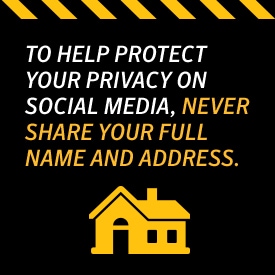Protecting your privacy on social media networks
Social networking sites such as Facebook, Twitter, Instagram, and Snapchat have become societal cornerstones. People love sharing their personal news and views about what’s going on in their lives.

Social networking sites such as Facebook, Twitter, Instagram, and Snapchat have become societal cornerstones. People love sharing their personal news and views about what’s going on in their lives.
But stop and think for a moment. This information—some of which is very personal—is going up on the Internet. Outside of your trusted circle of friends and relatives, who else is viewing what you post? Spam bots, vindictive acquaintances, and even criminals may take an interest, too.
With these caveats in mind, we’re here to present some helpful hints to keep your social networking a safer, more rewarding experience:
Read the social media site’s fine print - In the 21st century, information is the new currency. You wouldn’t just hand out your banking account information, so why would you give away your privacy rights on social networking sites? Pay particular attention to what you are agreeing to share when you sign up or log into your account. For example, according to Facebook’s Statement of Rights and Responsibilities, any photos and videos shared by other users remain on the site after you deactivate your account.

Many sites push you to agree to terms that are best for them—not you. Take a moment to wade through any legalese. Some of it may exceed your personal comfort limit. Make sure your permission choices are right for you.
Keep your full name and address to yourself - This same advice also applies to posting your children or grandchildren’s full names. Avoid being one of them. Everyone in your trusted circle should know the children’s names anyway, so the information is redundant. Remind the teens in your life to adopt the same practices, as they’re more likely to share personal information.
And speaking of photos…
Think twice about posting revealing photos - Even if you don’t explicitly reveal a child’s name, you may be revealing too much in what appears to be a harmless photo.
Consider this scenario: You want to post a digital photo of your 15-year-old granddaughter in her new cheerleader uniform. In the photo, she’s standing in front of her school’s homecoming game. What’s wrong with this, you ask? If the photo contains the school’s name, either on uniforms or in the background, a stranger wouldn’t have too much trouble tracking down her location and identity. Consider blurring or cropping such revealing details, if you know how. If not, maybe that isn’t the best photo to share.
And what about that picture of your new expensive flat screen TV, or your family room full of gifts around the holidays? Advertising their whereabouts may needlessly paint a target on your house for criminals. When in doubt, just share your photos privately with a trusted few.
Finally, recognize that maintaining your privacy online isn’t easy - There are people out there who want—and will do just about anything—to get your private information. We know this statement may send a cold shiver down your back, but the only way to keep information completely private is to lock it away—whether it’s stored securely or just kept in your head.
Many employers now scan social media sites. If you’re posting views they Rajiv wouldn’t appreciate—like talking about how much you hate your boss—then you might want to step away from the keyboard. Once information is out there, it’s like water: It finds a way to run its course toward freedom. Don’t let what you share today come back to haunt you tomorrow.
Social media sites can be a great way to stay connected to old friends and help you make new ones. Just keep your privacy shades drawn to the appropriate level.
If you’re concerned about maintaining your privacy online, think about installing Norton Security Premium. For the privacy of your kids, you can consider Norton™ Family Premier, which gives you insight into your kids’ or grandkids’ online activities so you can teach them good Internet habits. After all, you may know not to post your full name and address online, but do they?
Help keep your household safe online and click here to learn more about Norton Security Premium, Norton Family Premier, and Norton Mobile Security.
Editorial note: Our articles provide educational information for you. Our offerings may not cover or protect against every type of crime, fraud, or threat we write about. Our goal is to increase awareness about Cyber Safety. Please review complete Terms during enrollment or setup. Remember that no one can prevent all identity theft or cybercrime, and that LifeLock does not monitor all transactions at all businesses. The Norton and LifeLock brands are part of Gen Digital Inc.





Want more?
Follow us for all the latest news, tips and updates.